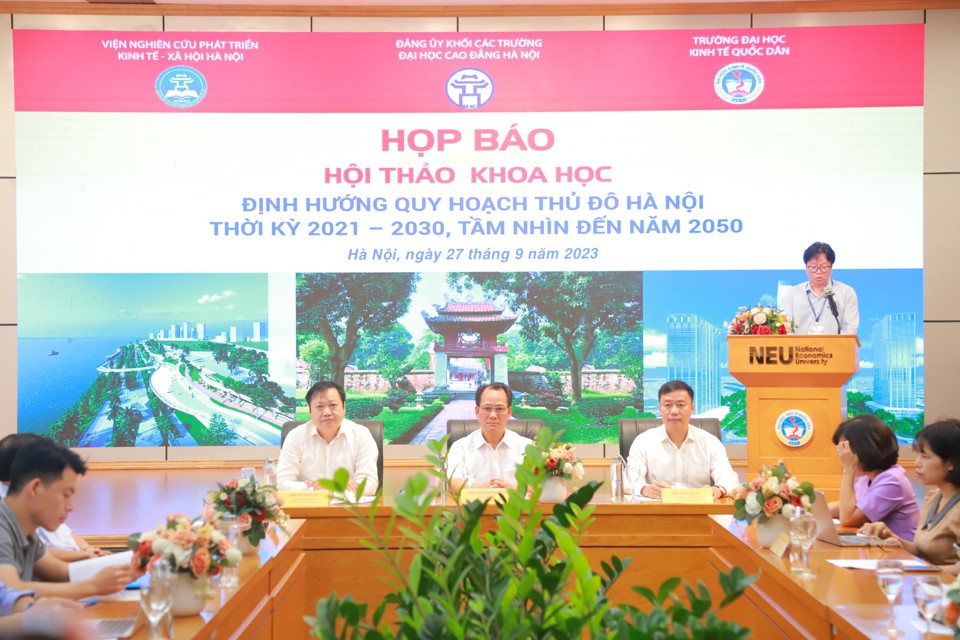Draft amended Capital Planning on track for submission to parliament in late October
Hanoi expects to gather opinions from the public and intellectual community to finalize the draft amended Capital Planning before submitting it to the National Assembly.
The draft revised Capital Planning has been completed on schedule and is expected to be submitted to the National Assembly for feedback by the end of October.
| Overview of the press conference. Photo: The Hanoi Times |
The information was revealed at a press conference held today [September 27] regarding the upcoming scientific conference on the Hanoi Capital Planning Orientation for the period 2021-2030, with a vision to 2050, to be held on September 29.
At the press conference, Director Le Ngoc Anh of the Hanoi Institute for Socio-Economic Development Studies noted the purpose of the conference is to harness the expertise and ingenuity of experts, scientists, officials, party members, and university professors from various institutions in shaping the Hanoi's Capital Planning for the 2021-2030 period, with a vision to 2050.
“Simultaneously, it serves as a platform for the intellectual community within Hanoi to propose solutions aimed to contribute to the socio-economic development of both the capital and the nation,” he said.
Anh further explained that the conference’s primary focus will be to provide feedback on the initial research findings about the Capital Planning conducted by the consulting unit.
The conference’s central discussions will revolve around offering recommendations for Hanoi's Capital Planning Orientation for 2021-2030, with a vision for 2050. This will encompass four planning principles, four philosophical concepts, five perspectives on capital development, three development scenarios, development objectives for the capital, and three pivotal stages (institutional, infrastructure development, and human resources).
Additionally, it will explore two key development areas for the Capital (the northern Red River city area and the western city area), industrial development directions, and plans and solutions for implementing the planning.
The conference will also delve into various topics, such as Hanoi's development conditions, including its inherent advantages, cultural and civilizational aspects, and available resources.
It will also focus on assessing the current status of socio-economic development, land use, urban and rural systems, technical infrastructure development, and environmental management and protection. The agenda also includes a discussion of the guiding principles for executing the planning, ultimately offering recommendations for the Hanoi Capital Planning Orientation for the 2021-2030 period, with an outlook to 2050.
Furthermore, conference delegates will concentrate on proposing development perspectives, objectives, breakthroughs, spatial organization, and the envisioned future of the capital, among other critical aspects.
The conference is expected to draw the participation of 350 attendees, including representatives from National Assembly committees, ministries, central government agencies, and various branches.
Delegates from Hanoi will include leaders from the Hanoi Party Committee, People's Council, People's Committee, Party committees within the municipal Party Committee, and officials from departments, branches, districts, and towns.
Notably, the conference will feature the active participation and valuable input of a group of intellectuals and scholars from more than 80 universities, colleges, and research institutions based in Hanoi.
The organization of this seminar represents a distinctive feature and advantage of Hanoi in mobilizing intellectual resources within the region, particularly for the specific purposes of Capital Planning and overall urban development. In essence, it showcases Hanoi's commitment to harnessing its local intellectual capacity for these crucial endeavors.
Vision for a future Hanoi: 1) It will be a heritage city characterized by a deeply rooted cultural heritage, showcasing the distinctive essence of the nation's capital, which has thrived for thousands of years. This heritage will be preserved, promoted, and elevated through the use of digital technology. 2) The city will be green, smart, prosperous, and tranquil, with the Red River as a central green axis and a focal point of the urban landscape. A prominent feature will be an extensive network of greenery and water bodies. It will also be a hub for science, technology, education, training, and national digital transformation. The city will embrace digital governance, foster a digital society, and cultivate digital-savvy citizens. The people of Hanoi will embody a sense of pride, elegance, kindness, and refinement, epitomizing Vietnamese culture, ethics, and human values. 3) This unique city will be a cultural and culinary tourism destination, offering high-quality services. It will host annual international events and thrive as a center of creativity. 4) As a globally integrated city, it will be the centerpiece where diverse cultures converge, crystallize, and radiate outward. It will showcase the capital's image as a place of peace, prosperity, and warm hospitality, inviting both domestic and international friends to visit. |












